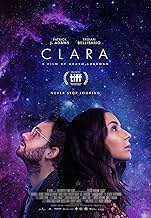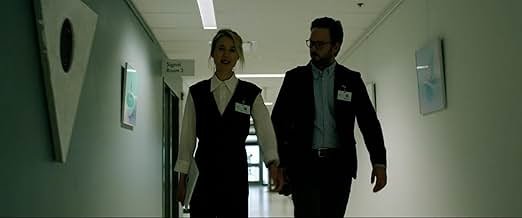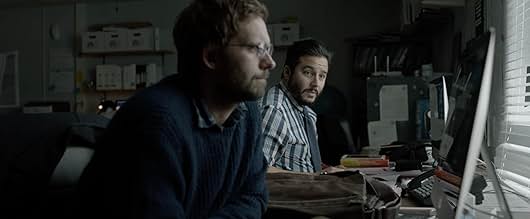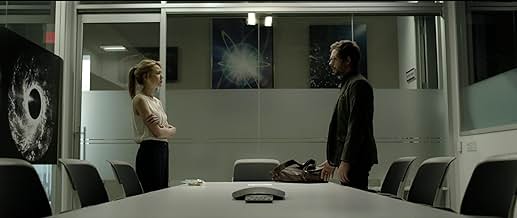An obsessive astronomer and a curious artist form an unlikely bond which leads them to a profound, scientific discovery.An obsessive astronomer and a curious artist form an unlikely bond which leads them to a profound, scientific discovery.An obsessive astronomer and a curious artist form an unlikely bond which leads them to a profound, scientific discovery.
- Awards
- 2 wins & 4 nominations
Charmaine D. Lau
- Reporter #2
- (as Charmaine Lau)
Nadine Whiteman
- Owner
- (as Nadine Roden)
Storyline
Did you know
- TriviaTroian Bellisario (Clara) and Patrick J. Adams (Isaac) are married in real life.
- GoofsAll entries contain spoilers
- Quotes
Clara: It seems too beautiful to just be random.
Dr. Isaac Bruno: It's beautiful because it's random.
- ConnectionsFeatured in CTV News at Six Toronto: Episode dated 10 September 2018 (2018)
Featured review
Wow, where to start.....
This is one of those movies that has so many layers to it's story, that all pieces together finely to make one, great piece of film making. Now I'm no expert reviewer, or even amateur scientist, but I'll do my best to explain this one.
Isaac Bruno is a scientist obsessed with finding a new planet, with the potential to harbour life, around distant stars. But he's a troubled man, having to deal with a very recent loss in his life, which greatly affects his work and career. Enter Clara, who agrees to be his unpaid research assistant, but has a very unscientific way of explaining her view of the universe. Together, when new data is released following the launch of a new space telescope, they attempt to find the elusive planet, whilst helping each other to deal with more earthly problems.
The relationship side of the story between Bruno and Clara, never becomes boring. The characters are so well played by the two lead actors, that you actually end up caring for their lives and situations, something that is rarely achieved in many movies nowadays. And their story is so well intertwined with the main plot.
The science behind the planet searching is explained in a way that doesn't treat you like an idiot (even one like me!!), so even those not used to this kind of movie should at least grasp the basics, and it certainly doesn't distract ones attention from the story.
We seem to be bombarded nowadays with so many sci-fi movies about alien invasions and superhero daring do, that movies like this seem to get lost in the ether. Indeed I don't remember this movie getting a cinematic release in the UK (but I could be wrong there). And that's a real shame because this is probably (in my opinion), one of the best "thinking mans" sci-fi movies out there.
If movies like Aliens, Independence Day or Predator, are your thing, then you will want to avoid this one. If, however you prefer the likes of Contact, 2001 etc, then this movie is an absolute must.
This is one of those movies that has so many layers to it's story, that all pieces together finely to make one, great piece of film making. Now I'm no expert reviewer, or even amateur scientist, but I'll do my best to explain this one.
Isaac Bruno is a scientist obsessed with finding a new planet, with the potential to harbour life, around distant stars. But he's a troubled man, having to deal with a very recent loss in his life, which greatly affects his work and career. Enter Clara, who agrees to be his unpaid research assistant, but has a very unscientific way of explaining her view of the universe. Together, when new data is released following the launch of a new space telescope, they attempt to find the elusive planet, whilst helping each other to deal with more earthly problems.
The relationship side of the story between Bruno and Clara, never becomes boring. The characters are so well played by the two lead actors, that you actually end up caring for their lives and situations, something that is rarely achieved in many movies nowadays. And their story is so well intertwined with the main plot.
The science behind the planet searching is explained in a way that doesn't treat you like an idiot (even one like me!!), so even those not used to this kind of movie should at least grasp the basics, and it certainly doesn't distract ones attention from the story.
We seem to be bombarded nowadays with so many sci-fi movies about alien invasions and superhero daring do, that movies like this seem to get lost in the ether. Indeed I don't remember this movie getting a cinematic release in the UK (but I could be wrong there). And that's a real shame because this is probably (in my opinion), one of the best "thinking mans" sci-fi movies out there.
If movies like Aliens, Independence Day or Predator, are your thing, then you will want to avoid this one. If, however you prefer the likes of Contact, 2001 etc, then this movie is an absolute must.
- freezageeza1966
- Oct 5, 2020
- Permalink
- How long is Clara?Powered by Alexa
Details
Box office
- Gross worldwide
- $50,211
- Runtime1 hour 45 minutes
- Color
- Sound mix
- Aspect ratio
- 2.35 : 1
Contribute to this page
Suggest an edit or add missing content






































